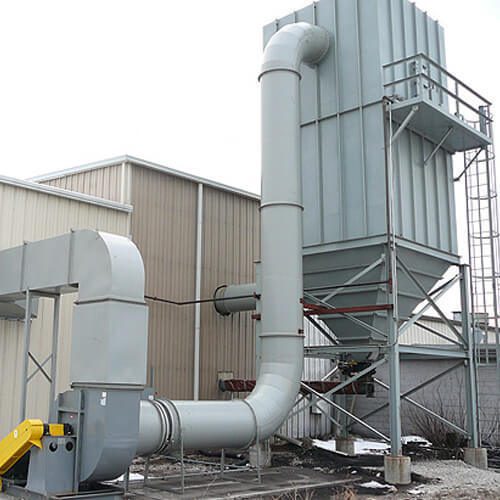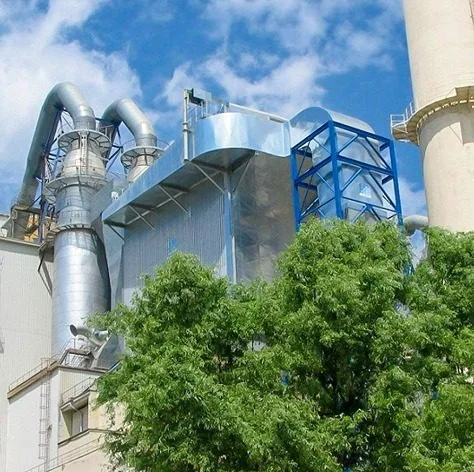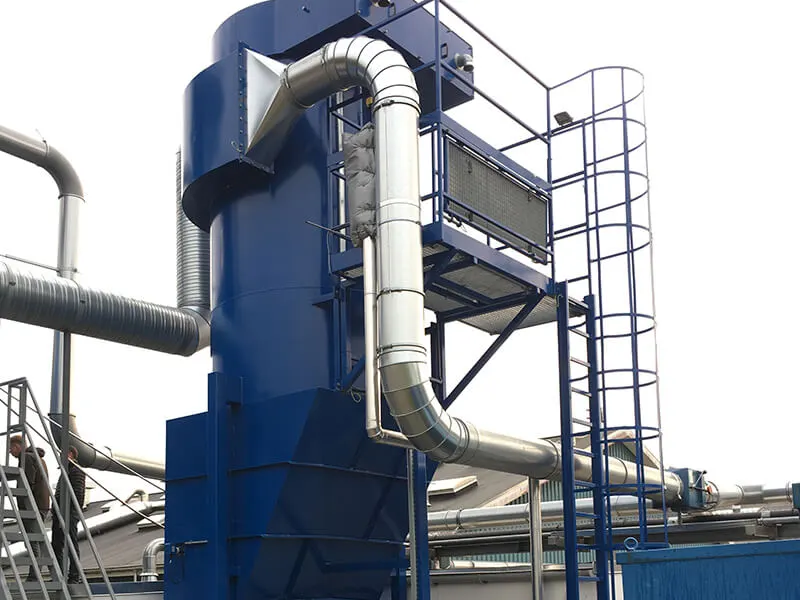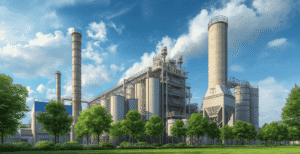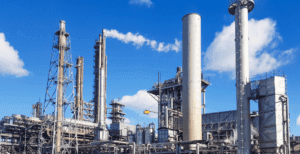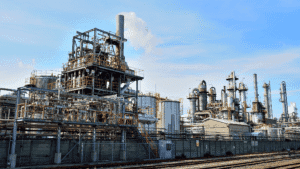Gas cleaning plants have become indispensable for industries aiming to comply with stringent CPCB and EPCA emission norms. In today’s industrial landscape, meeting these environmental regulations is not just a legal mandate but a mark of responsible and sustainable operations. The Central Pollution Control Board (CPCB) and the Environment Pollution Control Authority (EPCA) have enforced rigorous standards to ensure cleaner air and reduced environmental impact from industrial activities. As a result, industries are under increasing pressure to adopt effective emission control systems.
At Intensiv Filter Himenviro, we lead the way in delivering advanced gas cleaning plant solutions that not only align with these compliance requirements but also promote operational excellence and long-term sustainability across diverse sectors.
The Role of Gas Cleaning Plants in Emission Control
Industries such as cement manufacturing, power generation, steel production, and chemical processing release significant volumes of particulate matter, gases, and fumes into the air. These emissions can have a detrimental effect on both the environment and public health, making it crucial for industries to implement effective pollution control measures. Gas cleaning plants, also known as air pollution control systems, are specifically designed to capture and remove harmful particles and gases from exhaust streams before they are released into the atmosphere.
At the heart of these systems is the filtration process, which employs various methods such as electrostatic precipitators (ESPs), bag filters, and wet scrubbers to clean the gases emitted from industrial operations. The performance and efficiency of these systems play a crucial role in determining whether an industry can meet the emission standards set by regulatory bodies such as CPCB and EPCA.
Meeting CPCB/EPCA Emission Standards
The CPCB and EPCA have established strict norms for the emission of particulate matter (PM), sulfur dioxide (SO2), nitrogen oxides (NOx), and other hazardous gases. These emissions are a major concern because of their impact on air quality, which can lead to respiratory diseases, environmental degradation, and climate change. To help industries stay compliant with these regulations, gas cleaning plants must be designed to achieve high levels of pollutant removal.
Our gas cleaning plants are equipped with the latest technologies that effectively reduce particulate emissions, harmful gases, and aerosols to levels well below the CPCB and EPCA limits. We utilize state-of-the-art electrostatic precipitators (ESPs), fabric filters, and scrubbing systems, ensuring that the gases leaving the plant are purified to meet the required standards. By selecting the appropriate filtration technology for each application, we ensure high efficiency in removing particulate matter, dust, and toxic gases, all while minimizing operational costs and energy consumption.
High-Efficiency Filtration Technologies
To meet the exacting demands of regulatory standards, the gas cleaning plants provided by Intensiv Filter Himenviro utilize high-performance filtration technologies tailored to the specific needs of each industrial process.
Electrostatic Precipitators (ESPs) are commonly used for large-scale applications, where they work by using electrical charges to attract and collect particulate matter from flue gases. The particles are captured on collecting electrodes and then removed through periodic cleaning cycles. ESPs are particularly effective for high-temperature and high-volume applications, such as in power plants and cement kilns, making them ideal for industries that must comply with CPCB and EPCA emission standards.
For industries dealing with fine particulates and dust, fabric filters (or baghouses) offer exceptional performance in capturing even the smallest particles. These filters use woven or non-woven fabric bags that trap particulate matter as gases pass through them. Our fabric filters are designed to provide low pressure drop, high filtration efficiency, and easy maintenance, ensuring optimal performance and reduced energy consumption.
Wet scrubbers are another key technology used in gas cleaning plants to remove pollutants, particularly gases like sulfur dioxide (SO2) and hydrochloric acid (HCl). These systems use a liquid—usually water or a chemical solution—to absorb the pollutants from the gas stream. Wet scrubbers are highly effective for controlling acid gases, providing industries with a reliable way to meet emission norms.
Discover Our Range of Solutions:
Optimized Design for Energy Efficiency
At Intensiv Filter Himenviro, we understand that energy efficiency is a critical concern for industries looking to control emissions without incurring excessive operational costs. Our gas cleaning plants are designed with energy-saving features that optimize filtration efficiency while minimizing power consumption. Technologies like variable frequency drives (VFDs) for fan motors, energy-efficient cleaning mechanisms, and low-resistance filter media are integrated into our systems to provide significant energy savings.
Moreover, the modular design of our systems allows industries to scale their pollution control capacity according to their specific needs. Whether it’s a small-scale installation or a large, multi-unit system, our solutions are flexible and scalable, ensuring that industries only pay for the capacity they require.
Real-Time Monitoring and Maintenance
One of the key features that set our gas cleaning plants apart is the integration of real-time monitoring systems. These systems continuously track the performance of the filtration equipment, providing critical data on particulate levels, airflow, pressure, temperature, and other key parameters. This allows operators to make adjustments in real time, ensuring that the system is always functioning at its peak efficiency.
Additionally, our systems are equipped with advanced diagnostic tools that can detect potential maintenance issues before they cause system failure. Predictive maintenance features help minimize downtime and ensure that the plant operates continuously, meeting the stringent emission norms without interruption.
Contribution to Sustainable Industrial Practices
By helping industries meet CPCB and EPCA emission norms, our gas cleaning plants contribute significantly to a more sustainable industrial ecosystem. These technologies not only reduce the harmful impact of industrial emissions on air quality but also help organizations avoid penalties for non-compliance, improving their reputation as responsible corporate citizens. Furthermore, our solutions support industries in reducing their carbon footprint and contributing to global sustainability efforts.
Industries We Serve
Our gas cleaning plants serve a wide range of industries, including:
- Power Generation: Power plants produce large volumes of emissions, and our solutions are designed to handle high-temperature, high-volume gas streams, ensuring compliance with regulations.
- Cement and Steel Production: These industries are major sources of particulate pollution, and our gas cleaning plants ensure that their operations remain within the required emission limits.
- Chemical and Pharmaceutical Manufacturing: With their complex processes, these sectors require precise pollution control solutions to capture toxic gases and particulate matter.
- Food and Beverage Processing: Ensuring clean air within food processing plants is essential for both regulatory compliance and worker safety.
Conclusion
As industries continue to face pressure to meet increasingly stringent environmental regulations, gas cleaning plants provide an effective and efficient solution for reducing emissions and ensuring compliance with CPCB/EPCA norms. At Intensiv Filter Himenviro, we are proud to offer advanced filtration systems that not only help businesses meet regulatory standards but also contribute to sustainable industrial practices. By combining cutting-edge technologies, energy efficiency, and real-time monitoring, our gas cleaning plants provide industries with the tools they need to operate responsibly while minimizing their environmental impact.
In a world that is becoming more focused on sustainability, partnering with us for your emission control needs ensures that your operations will remain efficient, compliant, and environmentally conscious for years to come.

